Sentinel 分析
Sentinel 分析
Sentinel 版本 1.8.0。
滑动窗口
核心类

public ArrayMetric(int sampleCount, int intervalInMs) {
this.data = new OccupiableBucketLeapArray(sampleCount, intervalInMs);
}
public ArrayMetric(int sampleCount, int intervalInMs, boolean enableOccupy) {
if (enableOccupy) {
this.data = new OccupiableBucketLeapArray(sampleCount, intervalInMs);
} else {
this.data = new BucketLeapArray(sampleCount, intervalInMs);
}
}
统计的项有:
- PASS: 通过;
- BLOCK:阻塞;
- EXCEPTION:异常;
- SUCCESS:成功;
- RT:返回时间;
- OCCUPIED_PASS: 占下一个时间窗口通过 (>= 1.5.0)。
这些按照 MetricEvent 中定义的顺序存在 MetricBucket 中的 LongAdder[]。
LongAdder是个好东西,cache line, false sharing。
MetricBucket 存在 WindowWrap 中,而 WindowWrap 定义了:
- 窗口时间长度;
- 窗口的起始时间。
而 WindowWrap 以数组的形式存在于 LeapArray 中:
- 所有属性在创建
LeapArray时就已经确定; - 使用
AtomicReferenceArray来帮助MetricBucket数组的原子性。
当前窗口
WindowWrap<T> currentWindow(long timeMillis) 根据当前时间来确定处于哪个时间窗口:
- 如果
bucket缺失,则创建后 CAS 到data中; - 如果
bucket不缺:- 如果
bucket是实时有效的,则直接返回; - 如果
bucket是废弃的,则通过updateLock锁后,重置bucket。
- 如果
AtomicReferenceArray、Thread.yield()值得注意。这里WindowWrap数组中的元素是懒加载,创建后就反复使用这些。
入口
SphU::entry
private Entry entryWithPriority(ResourceWrapper resourceWrapper, int count, boolean prioritized, Object... args) throws BlockException {
// 获取方法调用的上下文环境,在 ThreadLocal 中
Context context = ContextUtil.getContext();
if (context instanceof NullContext) {
return new CtEntry(resourceWrapper, null, context);
}
if (context == null) {
// Using default context.
context = InternalContextUtil.internalEnter(Constants.CONTEXT_DEFAULT_NAME);
}
// 全局开关关闭
if (!Constants.ON) {
return new CtEntry(resourceWrapper, null, context);
}
// 加载处理链
ProcessorSlot<Object> chain = lookProcessChain(resourceWrapper);
if (chain == null) {
return new CtEntry(resourceWrapper, null, context);
}
Entry e = new CtEntry(resourceWrapper, chain, context);
try {
chain.entry(context, resourceWrapper, null, count, prioritized, args);
} catch (BlockException e1) {
e.exit(count, args);
throw e1;
} catch (Throwable e1) {
RecordLog.info("Sentinel unexpected exception", e1);
}
return e;
}
比较清晰明了。
ProcessorSlot<Object> lookProcessChain(ResourceWrapper resourceWrapper) {
// 缓存
ProcessorSlotChain chain = chainMap.get(resourceWrapper);
// 双重检测锁
if (chain == null) {
synchronized (LOCK) {
chain = chainMap.get(resourceWrapper);
if (chain == null) {
// Entry size limit. 6000
if (chainMap.size() >= Constants.MAX_SLOT_CHAIN_SIZE) {
return null;
}
chain = SlotChainProvider.newSlotChain();
Map<ResourceWrapper, ProcessorSlotChain> newMap = new HashMap<ResourceWrapper, ProcessorSlotChain>(
chainMap.size() + 1);
newMap.putAll(chainMap);
newMap.put(resourceWrapper, chain);
chainMap = newMap;
}
}
}
return chain;
}
- 使用了双重检测锁来保证缓存的安全;
- 这里
ResourceWrapper使用了name来判断相等; - 使用了
SPI机制,自己加了order来加载SlotChainBuilder和ProcessorSlot; - 使用了责任链。
默认提供:
# Sentinel default ProcessorSlots
# 构建调用链
com.alibaba.csp.sentinel.slots.nodeselector.NodeSelectorSlot
com.alibaba.csp.sentinel.slots.clusterbuilder.ClusterBuilderSlot
com.alibaba.csp.sentinel.slots.logger.LogSlot
# 实时收集实时消息
com.alibaba.csp.sentinel.slots.statistic.StatisticSlot
com.alibaba.csp.sentinel.slots.block.authority.AuthoritySlot
com.alibaba.csp.sentinel.slots.system.SystemSlot
com.alibaba.csp.sentinel.slots.block.flow.FlowSlot
com.alibaba.csp.sentinel.slots.block.degrade.DegradeSlot
Context
在 entryWithPriority 中有初始化 context 的代码:
if (context == null) {
// Using default context.
context = InternalContextUtil.internalEnter(Constants.CONTEXT_DEFAULT_NAME); // sentinel_default_context
}
protected static Context trueEnter(String name, String origin) {
Context context = contextHolder.get();
if (context == null) {
Map<String, DefaultNode> localCacheNameMap = contextNameNodeMap;
DefaultNode node = localCacheNameMap.get(name);
if (node == null) {
if (localCacheNameMap.size() > Constants.MAX_CONTEXT_NAME_SIZE) {
setNullContext();
return NULL_CONTEXT;
} else {
LOCK.lock();
try {
node = contextNameNodeMap.get(name);
if (node == null) {
if (contextNameNodeMap.size() > Constants.MAX_CONTEXT_NAME_SIZE) {
setNullContext();
return NULL_CONTEXT;
} else {
node = new EntranceNode(new StringResourceWrapper(name, EntryType.IN), null);
// Add entrance node.
Constants.ROOT.addChild(node);
Map<String, DefaultNode> newMap = new HashMap<>(contextNameNodeMap.size() + 1);
newMap.putAll(contextNameNodeMap);
newMap.put(name, node);
contextNameNodeMap = newMap;
}
}
} finally {
LOCK.unlock();
}
}
}
context = new Context(node, name);
context.setOrigin(origin);
contextHolder.set(context);
}
return context;
}
Context生命周期靠ThreadLocal,每个线程会有一个Context;Local cache map中存EntranceNode;- 用双重检测锁;
- 新建的
EntranceNode会加到ROOT中;
类图
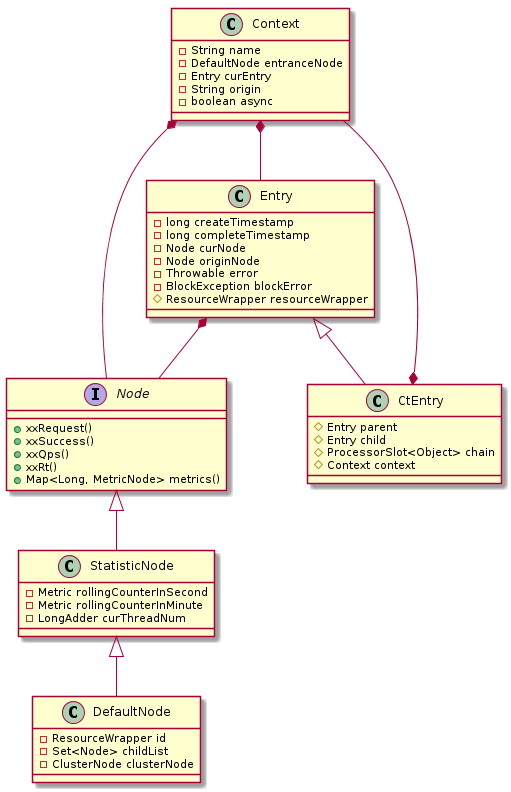
调用链
类图
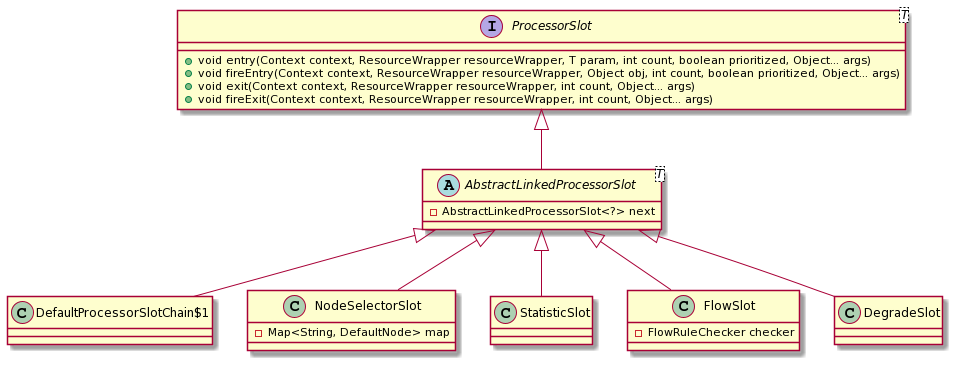
DefaultProcessorSlotChain$1作为 first dummy node ?;- 在上面
lookProcessChain中会为每个Resource创建一个ProcessorSlotChain;
NodeSelectorSlot
public void entry(Context context, ResourceWrapper resourceWrapper, Object obj, int count, boolean prioritized, Object... args)
throws Throwable {
DefaultNode node = map.get(context.getName());
if (node == null) {
synchronized (this) {
node = map.get(context.getName());
if (node == null) {
node = new DefaultNode(resourceWrapper, null);
HashMap<String, DefaultNode> cacheMap = new HashMap<String, DefaultNode>(map.size());
cacheMap.putAll(map);
cacheMap.put(context.getName(), node);
map = cacheMap;
// Build invocation tree
((DefaultNode) context.getLastNode()).addChild(node);
}
}
}
context.setCurNode(node);
fireEntry(context, resourceWrapper, node, count, prioritized, args);
}
- 最主要设置
Context::curEntry::curNode; - 创建
DefaultNode到EntranceNode后。
FlowSlot
Rule 类图
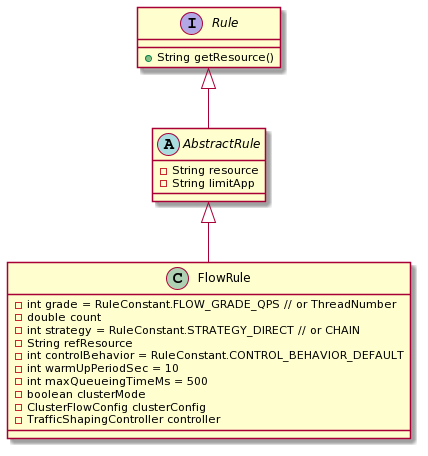
判断是能够通过,目前只关注本机限制流量:
// FlowRuleChecker
public void checkFlow(Function<String, Collection<FlowRule>> ruleProvider, ResourceWrapper resource, Context context, DefaultNode node, int count, boolean prioritized) throws BlockException {
// 没有规则或者没有资源标识
if (ruleProvider == null || resource == null) {
return;
}
Collection<FlowRule> rules = ruleProvider.apply(resource.getName());
// 该资源有规则则进行检查
if (rules != null) {
for (FlowRule rule : rules) {
if (!canPassCheck(rule, context, node, count, prioritized)) {
throw new FlowException(rule.getLimitApp(), rule);
}
}
}
}
public boolean canPassCheck(FlowRule rule, Context context, DefaultNode node, int acquireCount, boolean prioritized) {
String limitApp = rule.getLimitApp();
// limitApp 默认是 default
// 如果是 null,则不限制
if (limitApp == null) {
return true;
}
if (rule.isClusterMode()) {
return passClusterCheck(rule, context, node, acquireCount, prioritized);
}
return passLocalCheck(rule, context, node, acquireCount, prioritized);
}
private static boolean passLocalCheck(FlowRule rule, Context context, DefaultNode node, int acquireCount, boolean prioritized) {
Node selectedNode = selectNodeByRequesterAndStrategy(rule, context, node);
if (selectedNode == null) {
return true;
}
return rule.getRater().canPass(selectedNode, acquireCount, prioritized);
}
选择节点:
static Node selectNodeByRequesterAndStrategy(/*@NonNull*/ FlowRule rule, Context context, DefaultNode node) {
// 该条限流规则针对的调用方
String limitApp = rule.getLimitApp();
int strategy = rule.getStrategy();
// 本次请求的调用方,从当前上下文环境中获取
String origin = context.getOrigin();
// limitApp != (default || other)
if (limitApp.equals(origin) && filterOrigin(origin)) {
if (strategy == RuleConstant.STRATEGY_DIRECT) {
// Matches limit origin, return origin statistic node.
return context.getOriginNode();
}
return selectReferenceNode(rule, context, node);
} else if (RuleConstant.LIMIT_APP_DEFAULT.equals(limitApp)) {
if (strategy == RuleConstant.STRATEGY_DIRECT) {
// Return the cluster node.
return node.getClusterNode();
}
return selectReferenceNode(rule, context, node);
} else if (RuleConstant.LIMIT_APP_OTHER.equals(limitApp)
&& FlowRuleManager.isOtherOrigin(origin, rule.getResource())) {
if (strategy == RuleConstant.STRATEGY_DIRECT) {
return context.getOriginNode();
}
return selectReferenceNode(rule, context, node);
}
return null;
}
DefaultController 快速失败:
public boolean canPass(Node node, int acquireCount, boolean prioritized) {
// 当前已消耗的令牌数量
int curCount = avgUsedTokens(node);
// 请求的令牌数 + 已消耗的令牌数 > 总令牌数
if (curCount + acquireCount > count) {
// 存在优先级 && 基于QPS
if (prioritized && grade == RuleConstant.FLOW_GRADE_QPS) {
long currentTime;
long waitInMs;
currentTime = TimeUtil.currentTimeMillis();
// 尝试抢占下一个滑动窗口的令牌
waitInMs = node.tryOccupyNext(currentTime, acquireCount, count);
if (waitInMs < OccupyTimeoutProperty.getOccupyTimeout()) {
node.addWaitingRequest(currentTime + waitInMs, acquireCount);
node.addOccupiedPass(acquireCount);
sleep(waitInMs);
// PriorityWaitException indicates that the request will pass after waiting for {@link @waitInMs}.
throw new PriorityWaitException(waitInMs);
}
}
return false;
}
return true;
}
DegradeSlot 降级
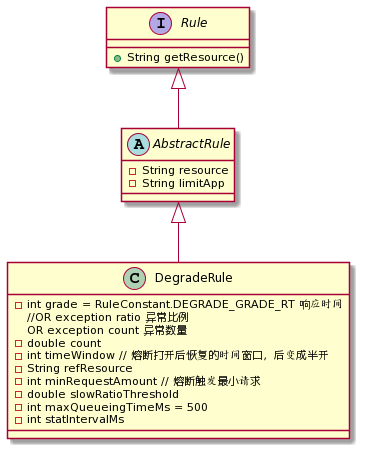
有三种模式:
- 平均响应时间;
- 异常比例;
- 异常数量。
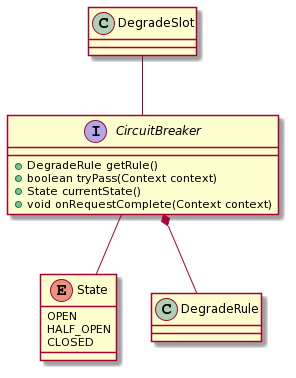
动态数据源
以 Naocs 为例,代码详见 NacosDataSourceDemo:
// NacosDataSourceDemo.java
// nacos server ip
private static final String remoteAddress = "localhost";
// nacos group
private static final String groupId = "Sentinel:Demo";
// nacos dataId
private static final String dataId = "com.alibaba.csp.sentinel.demo.flow.rule";
private static void loadRules() {
ReadableDataSource<String, List<FlowRule>> flowRuleDataSource = new NacosDataSource<>(remoteAddress, groupId, dataId,
source -> JSON.parseObject(source, new TypeReference<List<FlowRule>>() {
}));
FlowRuleManager.register2Property(flowRuleDataSource.getProperty());
}
private static final FlowPropertyListener LISTENER = new FlowPropertyListener();
private static SentinelProperty<List<FlowRule>> currentProperty = new DynamicSentinelProperty<List<FlowRule>>();
static {
currentProperty.addListener(LISTENER);
}
private static final class FlowPropertyListener implements PropertyListener<List<FlowRule>> {
@Override
public void configUpdate(List<FlowRule> value) {
Map<String, List<FlowRule>> rules = FlowRuleUtil.buildFlowRuleMap(value);
if (rules != null) {
flowRules.clear();
flowRules.putAll(rules);
}
RecordLog.info("[FlowRuleManager] Flow rules received: " + flowRules);
}
@Override
public void configLoad(List<FlowRule> conf) {
Map<String, List<FlowRule>> rules = FlowRuleUtil.buildFlowRuleMap(conf);
if (rules != null) {
flowRules.clear();
flowRules.putAll(rules);
}
RecordLog.info("[FlowRuleManager] Flow rules loaded: " + flowRules);
}
}
DynamicSentinelProperty 动态监听变化,调用 listener。